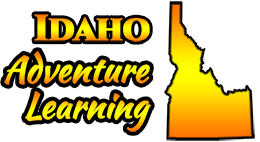The Big Picture
Submitted by Loy Felix on Fri, 2017-06-23 00:00
Today was the culmination of this week's place-based learning. Through the week we looked at the effects logging, mining, management of storm water drainage and recreation have had on the Coeur d'Alene water basin. We also looked at programs designed to remove the source of the problems that have been created, most inadvertently by we homo sapiens. My husband and I have lived in the area for 37 years and we have prided ourselves on learning the history, both human and natural, of the area. In one week I have learned so much more from the experts Marie scheduled. I think our entire group has a whole new understanding of the complexity of our water shed. Today we were visited by the volunteers from Gizmo. They are creating aquatic robotic devices that have the capability of capturing video, collecting samples, testing various water components, and, well.... use your imagination. They are offering to work with area middle schools to build these units to monitor local waters. Thanks to a grant, this program is free to the schools. Barb Mueller, the coordinator is excited by the educational uses this program could provide. The suggestIon was made that a youtube channel would be a great way to share results with any educators and the public. We also learned about the impact of storm water drainage. We learned how the use of infiltration wells, planting trees, picking up trash, creating swales, and disposing of leaves and organic matter that contain excess phosphorus contributing to algae blooms. Just before lunch, we kayaked around Blackwell Island and learned about how land management has changed on the island over the last century. We paddled over storm water outfalls, waste water outfalls, and through an active construction site for the Coeur d'Alene Resort Marina. All of these provided us with real life examples of ecosystem services in this region. We also visited with the Kootenai Environmental Action Gathering Garden Coordinators. They showed us how they collect rain water for irrigation in their green house. They also use drip irrigation and mulch to conserve water. The whole community can benefit from their efforts and the work of the volunteers because the food that is produced is shared with the volunteers and the excess is donated to feed the needy. The eductional applications of everything we learned this week are endless. I am excited to explore methods of bringing place-based learning into my classroom. Analyzing a bucket of water from the river using the tools we were exposed to this week is not as exciting as a field trip, but at times we have to make due with the mini field trips we take outside our classroom doors.
I want to thank Marie and all the speakers who shared their time and expertise with us. Our group was amazing. We had way too much fun! We also enjoyed sharing with our digital learners, who we lovingly called out digital lurkers. :) Your observations expanded on the educational applications and enriched our experience. Who would have thought water quality education could be so exciting!

Comments
Great summary
I'm glad you experienced learning and excitement to carry to your classroom, Loy. I wholeheartedly agree that the in-person experience is one of the best grad classes I have ever had the pleasure in which to participate. I would have loved to have been there for the Gathering Garden project visit.
Recap
I think it is great to read/hear about activities going on in our area to help keep our waterways healthy. So many people who use the rivers and lakes in North Idaho seem to be clueless about how their actions on or near the water effect all living things.I think is a lack of education and programs like this should somehow be more accessible or participation mandatory for people whom live in this area.
Recap
I feel the same way, Brian. I learned so much. This was absolutely the most exciting, idea generating science course I have ever taken.